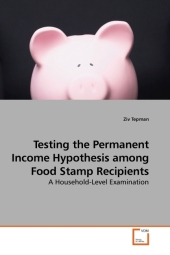 Neuerscheinungen 2010Stand: 2020-01-07 |
Schnellsuche
ISBN/Stichwort/Autor
|
Herderstraße 10
10625 Berlin
Tel.: 030 315 714 16
Fax 030 315 714 14
info@buchspektrum.de |

Ziv Tepman
Testing the Permanent Income Hypothesis among Food Stamp Recipients
A Household-Level Examination
2010. 72 S.
Verlag/Jahr: VDM VERLAG DR. MÜLLER 2010
ISBN: 3-639-20308-9 (3639203089)
Neue ISBN: 978-3-639-20308-0 (9783639203080)
Preis und Lieferzeit: Bitte klicken
The permanent income hypothesis (PIH) posits that consumers decide how much money to spend in a given period based on a rational assessment of future income. They react to unusual events by borrowing or saving as necessary in order to smooth their consumption across time. Is this model an accurate picture of how households make their spending decisions? Specifically, can low-income households on welfare smooth their consumption, even though borrowing and saving could be quite difficult? A detailed survey of food stamp recipients conducted in San Diego County in 1990 is used to explore the relationship between a household s expected future income and its spending behavior in the present on food, clothing, and other items. Key implications of the PIH are tested by decomposing households income into permanent and transitory components, a method that not has been used in other PIH literature in such a manner. An interesting finding is also made regarding these households ability to spend more than they receive. This analysis reveals important insights for anyone interested in the implications of the PIH, or in learning how America s welfare population manages its spending.
Ziv Tepman, BA: Economics at Stanford University. MS Management Science and Engineering at Stanford University.


